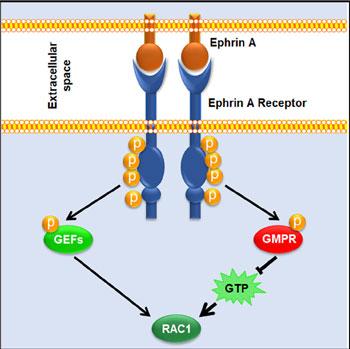
Dr. Mikhail Nikiforov’s group published a study that has uncovered a novel regulatory signal transduction pathway by Ephrin Receptors in melanoma. Ephrin Receptors for long time have been known for exerting either tumor suppressor or oncogenic functions while the exact mechanisms were not well understood. The study led by Dr. David Wolff, the first author of the paper, demonstrated that anti- or pro-melanoma functions of Ephrin Receptor 4 depend on its ability to modify (and thereby activate) a nucleotide metabolism enzyme Guanosine Monophosphate Reductase (GMPR). Activation of GMPR leads to decrease in the intracellular levels of nucleotide GTP, one of the central signaling molecules in the cell, whereas a decrease in GTP suppresses activity of GTP-binding proteins RAC1 and RHOA which are essential for tumor progression. These findings could lead to the development of long-awaited RAC1-suppressing anticancer drugs. Read the full article in Cell Chemical Biology.